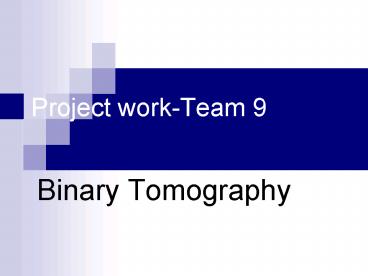Project workTeam 9 PowerPoint PPT Presentation
1 / 22
Title: Project workTeam 9
1
Project work-Team 9
- Binary Tomography
2
Team 9-Binary Tomographers
- Attila Kozma, University of Szeged
- Tibor Lukic, University of Novi Sad
- Erik Wernersson, Uppsala University
- Vladimir Curic, University of Novi Sad
3
Outline
- Binary Tomography
- The Problem
- Optimization techniques
- Evaluation of proposed methods
4
Binary Tomography
- Tomography is imaging by sections.
- Binary Tomography is a subset of Tomography.
- Image is binary.
5
The problem
- Problem-How to (re) construct image if we know a
few projection vectors.
6
Modeling the problem
- Horizontal and vertical projections
- Different projections, different angles
- One rayone equation
7
General overview
Prior information has to be used.
8
Simulated Annealing
Pseuocode outline Set Initial Temperature,
T2 Generate Initial Solution WHILE Tgt0 DO
1) Create A New Possible Solution 2) Choose
The Best Solution According To The Objective
Function Or Choose The Worst With
Probability exp(delta E / T) 3) Lower The
Energy According To Scheme END
9
Three Projections
10
Four Projections
11
Deterministic Binary Tomography
Combinatorial optimization problem.
Convex relaxation.
where the binary factor, µgt0 and vector
e(1,1,,1). Starting with zero value of µ, we
iteratively increase µ to enforce binary
solutions.
An optimization problem is solved by application
of SPG algorithm.
12
SPG Algorithm
The Spectral Projected Gradient (SPG) algorithm
is a deterministic optimization for solving
convex-constrained problem
,
where O is a closed convex set. Introduced by
Birgin, Martinez and Raydan (2000).
Requirements.
- f is defined and has continuous partial
derivatives on O - The projection of an arbitrary point onto a set O
is defined.
13
SPG based Algorithm for Binary Tomography
.
14
Experiments
Reconstruction from projections without any noise.
15
Experiments
Reconstructions from projections with Gaussian
noise (mean0, variance 0.01).
16
Branch and Bound
- Original problem
- Associated problem
Relaxation of associated problem
17
Branching
18
Bounding
- Too many branches.
- We have to cut.
- Solve the relaxation of the actual problem.
- The optimum of the relaxation (Z) gives a lower
boundary. - In the whole subtree only bigger values than Z
are possible for optimal solutions.
19
Experiments
20
Experiments
21
Evaluation of the proposed methods
Original
B B
SPG
S. A.
Reconstructions from 2 projections by different
methods.
22
Evaluation of the proposed methods
SPG
S. A.
Original
Reconstructions from 4 projections in comparable
time
23
Thank you!

